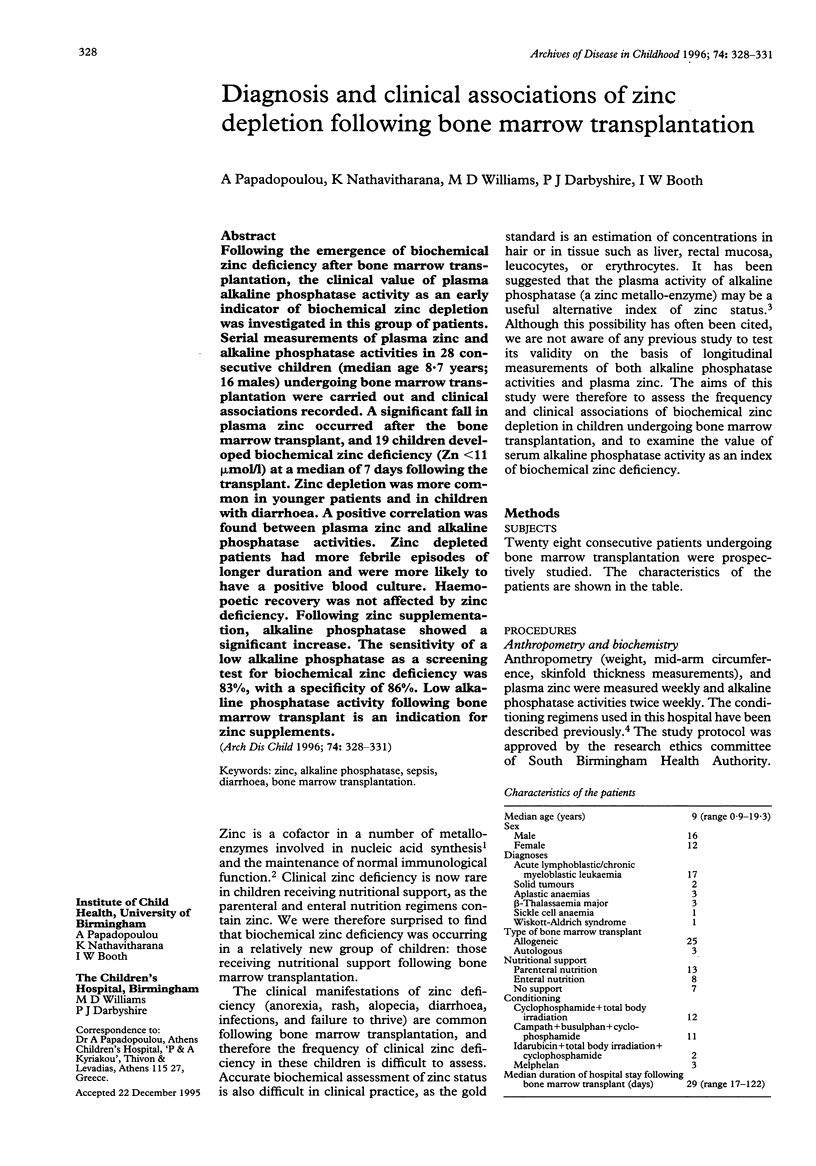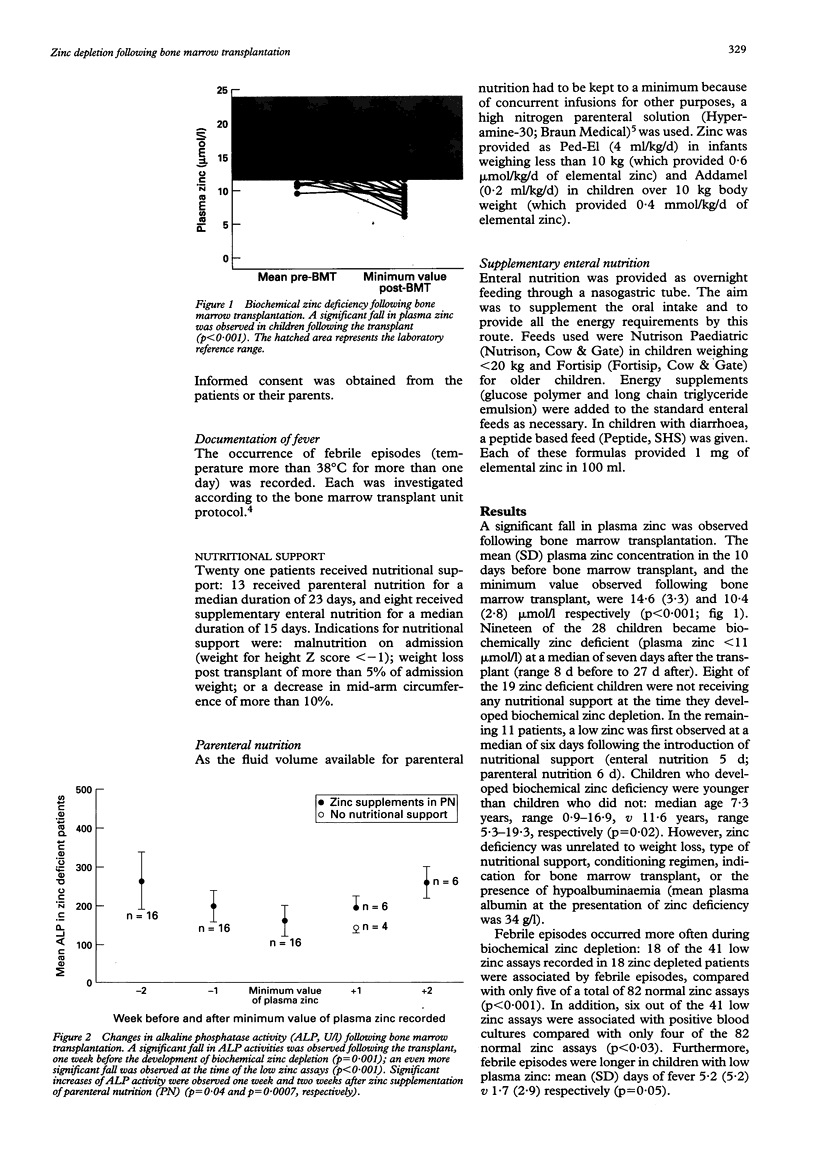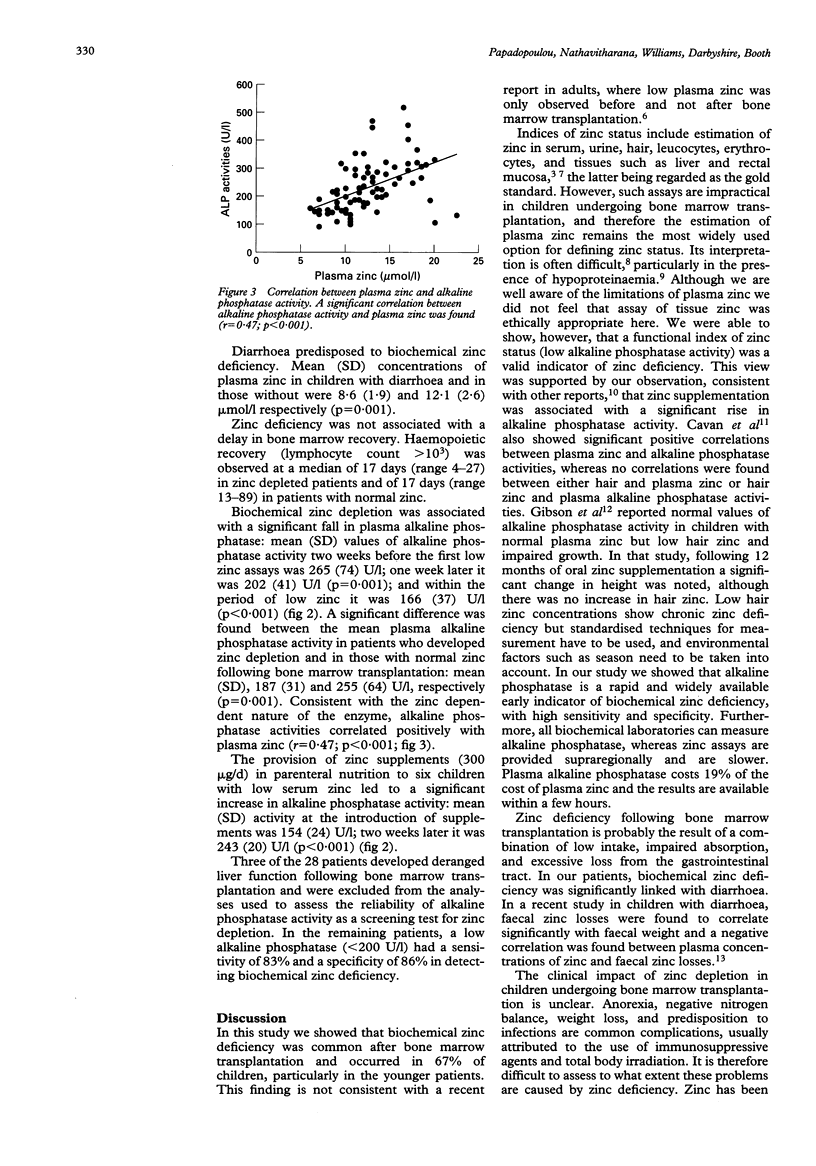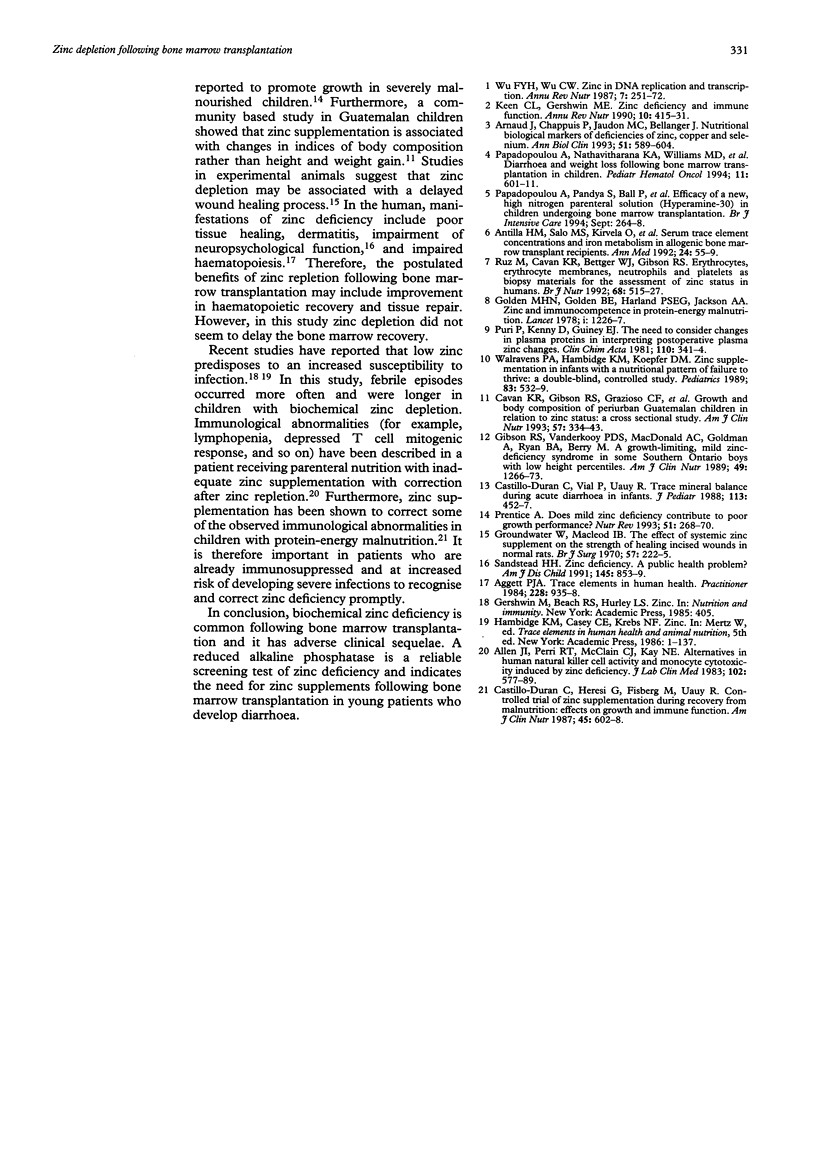Abstract
Following the emergence of biochemical zinc deficiency after bone marrow transplantation, the clinical value of plasma alkaline phosphatase activity as an early indicator of biochemical zinc depletion was investigated in this group of patients. Serial measurements of plasma zinc and alkaline phosphatase activities in 28 consecutive children (median age 8.7 years; 16 males) undergoing bone marrow transplantation were carried out and clinical associations recorded. A significant fall in plasma zinc occurred after the bone marrow transplant, and 19 children developed biochemical zinc deficiency (Zn < 11 mumol/l) at a median of 7 days following the transplant. Zinc depletion was more common in younger patients and in children with diarrhoea. A positive correlation was found between plasma zinc and alkaline phosphatase activities. Zinc depleted patients had more febrile episodes of longer duration and were more likely to have a positive blood culture. Haemopoetic recovery was not affected by zinc deficiency. Following zinc supplementation, alkaline phosphatase showed a significant increase. The sensitivity of a low alkaline phosphatase as a screening test for biochemical zinc deficiency was 83%, with a specificity of 86%. Low alkaline phosphatase activity following bone marrow transplant is an indication for zinc supplements.
Full text
PDF



Selected References
These references are in PubMed. This may not be the complete list of references from this article.
- Aggett P. J. Trace elements in human health. Practitioner. 1984 Oct;228(1396):935–938. [PubMed] [Google Scholar]
- Allen J. I., Perri R. T., McClain C. J., Kay N. E. Alterations in human natural killer cell activity and monocyte cytotoxicity induced by zinc deficiency. J Lab Clin Med. 1983 Oct;102(4):577–589. [PubMed] [Google Scholar]
- Antila H. M., Salo M. S., Kirvelä O., Näntö V., Rajamäki A., Toivanen A. Serum trace element concentrations and iron metabolism in allogeneic bone marrow transplant recipients. Ann Med. 1992 Feb;24(1):55–59. doi: 10.3109/07853899209164145. [DOI] [PubMed] [Google Scholar]
- Arnaud J., Chappuis P., Jaudon M. C., Bellanger J. Marqueurs biologiques nutritionnels des carences en zinc, cuivre et sélénium. Ann Biol Clin (Paris) 1993;51(6):589–604. [PubMed] [Google Scholar]
- Castillo-Duran C., Heresi G., Fisberg M., Uauy R. Controlled trial of zinc supplementation during recovery from malnutrition: effects on growth and immune function. Am J Clin Nutr. 1987 Mar;45(3):602–608. doi: 10.1093/ajcn/45.3.602. [DOI] [PubMed] [Google Scholar]
- Castillo-Duran C., Vial P., Uauy R. Trace mineral balance during acute diarrhea in infants. J Pediatr. 1988 Sep;113(3):452–457. doi: 10.1016/s0022-3476(88)80627-9. [DOI] [PubMed] [Google Scholar]
- Cavan K. R., Gibson R. S., Grazioso C. F., Isalgue A. M., Ruz M., Solomons N. W. Growth and body composition of periurban Guatemalan children in relation to zinc status: a cross-sectional study. Am J Clin Nutr. 1993 Mar;57(3):334–343. doi: 10.1093/ajcn/57.3.334. [DOI] [PubMed] [Google Scholar]
- Gibson R. S., Vanderkooy P. D., MacDonald A. C., Goldman A., Ryan B. A., Berry M. A growth-limiting, mild zinc-deficiency syndrome in some southern Ontario boys with low height percentiles. Am J Clin Nutr. 1989 Jun;49(6):1266–1273. doi: 10.1093/ajcn/49.6.1266. [DOI] [PubMed] [Google Scholar]
- Golden M. H., Harland P. S., Golden B. E., Jackson A. A. Zinc and immunocompetence in protein-energy malnutrition. Lancet. 1978 Jun 10;1(8076):1226–1228. doi: 10.1016/s0140-6736(78)92463-7. [DOI] [PubMed] [Google Scholar]
- Groundwater W., Macleod I. B. The effects of systemic zinc supplements on the strength of healing incised wounds in normal rats. Br J Surg. 1970 Mar;57(3):222–225. doi: 10.1002/bjs.1800570317. [DOI] [PubMed] [Google Scholar]
- Keen C. L., Gershwin M. E. Zinc deficiency and immune function. Annu Rev Nutr. 1990;10:415–431. doi: 10.1146/annurev.nu.10.070190.002215. [DOI] [PubMed] [Google Scholar]
- Papadopoulou A., Nathavitharana K. A., Williams M. D., Darbyshire P. J., Booth I. W. Diarrhea and weight loss after bone marrow transplantation in children. Pediatr Hematol Oncol. 1994 Nov-Dec;11(6):601–611. doi: 10.3109/08880019409141807. [DOI] [PubMed] [Google Scholar]
- Prentice A. Does mild zinc deficiency contribute to poor growth performance? Nutr Rev. 1993 Sep;51(9):268–270. doi: 10.1111/j.1753-4887.1993.tb03118.x. [DOI] [PubMed] [Google Scholar]
- Puri P., Kenny D., Guiney E. J. The need to consider changes in plasma proteins in interpreting post-operative plasma zinc changes. Clin Chim Acta. 1981 Mar 5;110(2-3):341–344. doi: 10.1016/0009-8981(81)90365-x. [DOI] [PubMed] [Google Scholar]
- Ruz M., Cavan K. R., Bettger W. J., Gibson R. S. Erythrocytes, erythrocyte membranes, neutrophils and platelets as biopsy materials for the assessment of zinc status in humans. Br J Nutr. 1992 Sep;68(2):515–527. doi: 10.1079/bjn19920109. [DOI] [PubMed] [Google Scholar]
- Walravens P. A., Hambidge K. M., Koepfer D. M. Zinc supplementation in infants with a nutritional pattern of failure to thrive: a double-blind, controlled study. Pediatrics. 1989 Apr;83(4):532–538. [PubMed] [Google Scholar]
- Wu F. Y., Wu C. W. Zinc in DNA replication and transcription. Annu Rev Nutr. 1987;7:251–272. doi: 10.1146/annurev.nu.07.070187.001343. [DOI] [PubMed] [Google Scholar]


